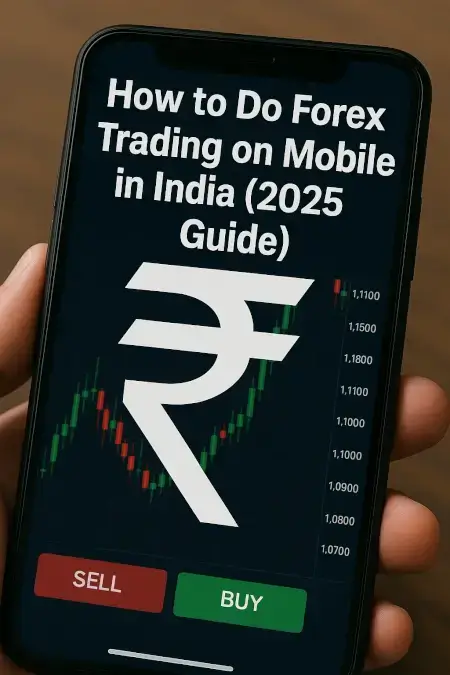📱 How to Do Forex Trading on Mobile in India: Beginner’s Guide (2025)
Have you ever wondered if you can trade forex using just your smartphone? You absolutely can — and in India, it’s getting easier by the day. With trading apps offering advanced charting tools, instant alerts, and real-time order placement, forex trading on mobile in India is now more accessible than ever.
But before you download just any app and start placing trades, there are a few important rules and steps you need to understand — especially since India has specific legal restrictions around forex trading.
In this article, I’ll walk you through the exact steps to start trading forex legally and safely from your mobile phone in India.
📌 Is Forex Trading on Mobile Legal in India?
Let’s address the elephant in the room — yes, forex trading is legal in India, but with conditions.
👉 You can only trade currency pairs that include the Indian Rupee (INR) — like USD/INR, EUR/INR, GBP/INR, and JPY/INR.
👉 Trading these pairs is allowed only through SEBI-regulated Indian brokers and on authorized exchanges like NSE or BSE.
👉 Trading cross-currency pairs like EUR/USD or USD/JPY is not allowed unless done via Indian exchanges in the form of derivatives.
⚠️ Never use international forex trading apps (those offering CFDs or leverage on global pairs) — they’re banned under RBI guidelines and can get you in serious legal trouble under FEMA regulations.
📚 Want to go deeper? Check out our article: Is Forex Trading Legal in India?
📲 Step-by-Step: How to Start Forex Trading on Mobile in India
Let’s break it down into a beginner-friendly step-by-step process.
✅ Step 1: Choose a SEBI-Registered Trading App
Not all apps are made equal — always use a broker registered with SEBI. Here are some popular options trusted by lakhs of Indian traders:
- Zerodha Kite
- Upstox Pro
- Angel One App
- ICICI Direct
- Groww
📥 Download their apps only from the official app stores (Google Play or iOS App Store). Avoid APKs and third-party sites.
✅ Step 2: Open Your Trading + Demat Account Online
The account opening process is 100% digital now:
- Do your KYC using Aadhaar and PAN.
- Submit a selfie and bank proof.
- Tick the “Currency Derivatives” segment while signing up.
- Link your UPI or net banking for easy fund transfers.
Approval usually takes a few hours.
💡 Need funds to get started? Consider this option:
👉 Apply for a Personal Loan (Instant Approval) (affiliate)
✅ Step 3: Add Money and Build Your Watchlist
Once your account is live:
- Add funds from your linked bank account (most apps allow UPI).
- Search and add pairs like USD/INR or EUR/INR to your watchlist.
- Start tracking charts and movements.
📈 Pro tip: Start with paper trading (demo) to understand the market rhythm without risking real money.
✅ Step 4: Place Your First Trade (On Your Phone!)
Here’s how simple it is to place a trade:
- Tap on your selected currency pair (e.g., USD/INR).
- Click Buy or Sell.
- Enter lot size (1 lot = 1,000 units).
- Choose between Market Order or Limit Order.
- Set Stop Loss to protect your downside.
- Confirm the trade.
📊 Many apps even allow you to draw trendlines, use RSI, and view candlestick patterns — all from your phone.
💡 Quick Tips for Smart Mobile Forex Trading
| Tip | Why It Helps |
|---|---|
| Use Wi-Fi over mobile data | More stable execution |
| Set alerts | Never miss a breakout |
| Trade during active hours (9 AM–5 PM) | Highest liquidity |
| Don’t chase the market | Wait for confirmation |
🧾 Do You Need to Pay Taxes on Forex Profits?
Absolutely, yes.
- If you’re trading actively, your profits fall under Business Income.
- You’ll need to file ITR-3 and may need to maintain basic books of accounts.
- Profits are taxed as per your slab.
📝 Keep a record of every trade — your broker’s mobile app usually has downloadable trade summaries.
❗️ Avoid These Common Mobile Forex Mistakes
- Using international CFD apps — illegal in India
- Overtrading due to app addiction
- Not setting a Stop Loss
- Trading during high spread hours (like early morning or late night)
- Falling for “copy trading” or “forex multiplier” scams
Stick with SEBI-authorized platforms and you’ll be safe.
👋 Final Thoughts
Forex trading on mobile in India is legal, easy, and beginner-friendly — as long as you stay within the rules. With the right app, a little market understanding, and discipline, your smartphone can be a powerful currency trading tool.
Take your time. Learn the ropes. Start small. And remember — it’s not just about profits, but about smart decisions.
Happy Trading! 📱💹
